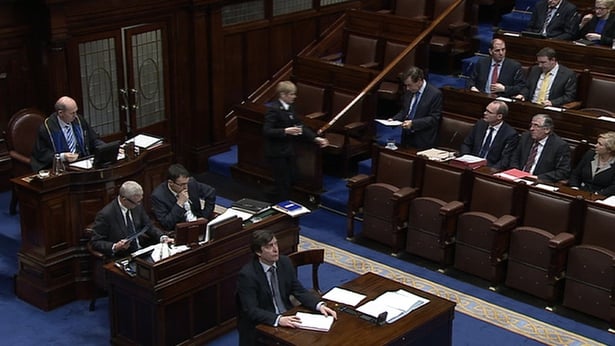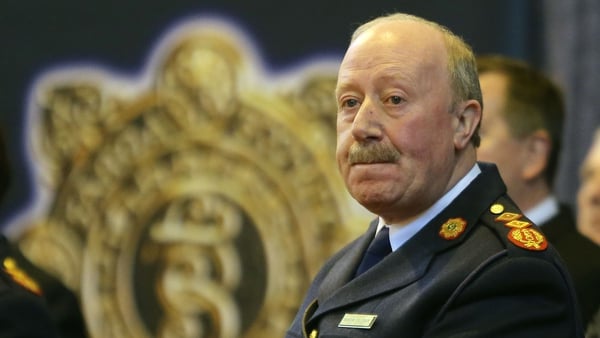Fianna Fáil leader Micheál Martin has said Taoiseach Enda Kenny effectively "sacked" former garda commissioner Martin Callinan after it emerged he sent a senior civil servant to see him.
Speaking in the Dáil, Mr Kenny confirmed he sent a senior civil servant to Mr Callinan the day before he announced his retirement.
Mr Kenny said he sent the Secretary General of the Department of Justice to see Mr Callinan because of how seriously he regarded the revelation that phone calls to garda stations had been recorded.
Mr Martin asked the Taoiseach why Attorney General Máire Whelan did not go to Minister for Justice Alan Shatter over the four-month period that she would have been aware of the specifics of the case and the importance of it.
Mr Kenny said he called the AG on Sunday and she indicated that there was a matter that she wanted to discuss, but that she did not want to do so on the telephone.
This drew laughs from the Opposition TDs in the Dáil for Leaders' Questions.
The Taoiseach said the fundamental role of the AG is to give legal advice to the Government.
Mr Kenny said she is bound to have all the facts at her disposal before she can make a judgment.
He said the matter went beyond a single case and now amounted to 2,500 tapes recorded up to 2008.
Sinn Féin leader Gerry Adams said the Taoiseach should ask the minister to stand down.
However, Mr Kenny said Mr Adams was "focused on a head".
Leaders' Questions followed a morning session when Mr Shatter made a statement on the recordings of phone calls to garda stations.
Mr Shatter told the Dáil the Department of Justice knew about the recording of telephone calls in garda stations almost a month before he was informed.
The minister said departmental officials were made aware of recordings of relevance to the specific civil proceedings on 28 February by An Garda Síochána and the Chief State Solicitor's Office.
He said this arose from its involvement in the response to the civil proceedings.
Mr Shatter also confirmed the contents of Mr Callinan's letter to him and that it was sent to his department more than two weeks ago.
He said he was not made aware of the contents of that letter for two weeks and did not see it until 12.40pm yesterday.
The minister told TDs the system of recording phone calls was of "serious concern".
He said the circumstances surrounding the recordings' relevance were still "unclear" and that the facts needed to be established.
Mr Shatter began his 15-minute speech with praise for Mr Callinan, who retired yesterday after 41 years in the force.
As it Happened: Garda Controversy
The minister went on to say it was "simply not the case that he knew" about the recordings last year.
He said the Garda Síochána Ombudsman Commission's report of 16 June last year gave "no indication" of the nationwide system of recordings at garda stations.
Mr Shatter said no "reasonable" person could claim that there had been any inaction on his part or the part of the Government to the series of "disturbing issues".
He said the Government had an unflinching determination to face up to past difficulties and he said it was important to await the outcome of the Commission of Investigation into the recordings of phone calls.
Mr Shatter also said the next garda commissioner will be appointed after an open competition.

Opposition calls for Shatter's resignation
The minister's statement was followed by statements from Fianna Fáil, Sinn Féin and TDs from the Technical Group.
Fianna Fáil justice spokesperson Niall Collins said the administration of justice under the watch of Mr Shatter was in total crisis and had been for a long time.
He said this had occurred through a series of the minister's actions, inactions and incompetence.
Mr Collins said that was what made him completely unfit for office at this point in time.
Mr Collins also mentioned the treatment of garda whistleblowers John Wilson and Sergeant Maurice McCabe.
He said both the minister and the Taoiseach could not bring themselves to do right by the two men.
Sinn Féin justice spokesperson Pádraig Mac Lochlainn said it was the latest in a series of scandals surrounding gardaí and the minister.
Mr Mac Lochlainn said Mr Shatter should do the right thing and follow in the footsteps of Mr Callinan and resign.
He also reiterated his call for Mr Shatter to apologise to the whistleblowers.
Independent TD Clare Daly said it was time for the minister to resign as his position was not credible.
She said there is a "crisis in policing" and a dysfunctional police force, which is undermining the confidence of decent gardaí.

Independent TD Shane Ross said there is something pretty rotten in the Department of Justice if the officials did not tell the minister about the letter before yesterday.
He said the minister's explanation was "totally incredible" and he asked whether he was informed of the contents of the letter prior to actually seeing it yesterday.
Mr Ross said no one can believe that a letter of this importance was not passed on to the minister earlier.
Socialist Party TD Joe Higgins said he believed Mr Shatter would be gone very soon.
However, he said what he described as the opportunism and the incompetence of the Taoiseach would then come into play, as well as the cowardice of the Labour ministers.
People Before Profit Alliance TD Richard Boyd Barrett asked how an urgent letter could not have been opened before the minister went to Mexico for St Patrick's Day.
Mr Boyd Barrett said either the minister was not telling the truth or it indicated a level of incompetence that was staggering.
He said it was beyond belief.
Independent TD Stephen Donnelly said Minister Shatter did not have the trust of gardaí, the public or GSOC.
He said it also appeared he did not have the trust of the Attorney General.
Mr Donnelly said the Taoiseach should put the interests of gardaí ahead of his loyalty to the minister.
In response to the Opposition statements, Mr Shatter said it defies belief to say the issue was "strategically organised" to be released yesterday.
He said the information was not given to him until yesterday and if it had been given to him earlier there would have been no advantage in him keeping it from the Cabinet.
Mr Shatter said that despite the "narrative of criticism" coming at him from Opposition politicians, he is dealing with emerging problems in the justice system that have taken many years to see the light of day.
Minister for Health James Reilly also said he does not believe that Mr Shatter should resign, saying such a move would "not be appropriate at all".
Mr Reilly said Mr Shatter was an "enormously reforming minister" and had laid out in the Dáil this morning the sequence of events that led to the resignation of Mr Callinan.
Mr Reilly said he presumed that the Attorney General had wanted to have all the relevant facts at her disposal before advising the Government on any serious legal matter, such as the widespread taping of calls at garda stations.
He said Ms Whelan was a "fastidious, dedicated, committed, careful" Attorney General.
Journalists, gardaí and witness among those recorded
It emerged earlier that the Department of Justice was informed that journalists, members of the gardaí and a witness in a criminal investigation were among those whose conversations were recorded and retained in garda stations.
The information was furnished in the letter by Mr Callinan, who asked that it be brought to Mr Shatter's attention.
The letter informs the department about the tape recordings in garda stations and the fact that the Attorney General had been consulted four months previously and a working group established.
It also states that the conversations of journalists seeking information, members of the gardaí and a witness in a criminal investigation had been recorded.
It states these conversations took place on various dates in the 1990s and that the analysis of the more than 2,400 recordings was continuing.
The revelations could have an impact on court cases past and present.
This may include possible appeals to convictions on the basis that defence counsel might not have been given full disclosure of material, including these recordings.
TDs debated the report that was critical of the administration of the penalty points system.
The Garda Inspectorate found fundamental shortcomings in the scheme and recommended wide-ranging reforms.

